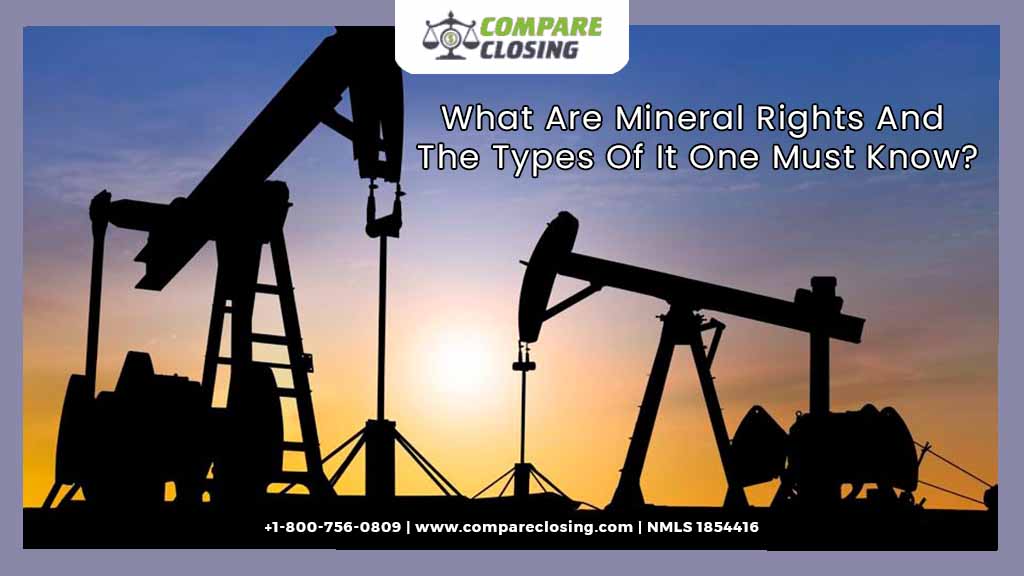Table of Contents
- What Are Netting Escrows & How Does It Work?: The Best Guide - January 2, 2024
- The Secret About Prescriptive Easement: Top Guide 1 Must Know - December 4, 2023
- About Home Equity Loans In Texas And How Can One Obtain It - November 27, 2023
Introduction
When you buy a property you have exclusive rights to the property to make any amends that you like.
In most cases, these are surface rights given to the homeowner to make any changes on the land and the property.
However, if your property is built on land which is near mining activities, you might come across mineral rights.
In this post, we will understand what is mineral rights on a property and how it works in detail.
What Are Mineral Rights?
Mineral rights refer to the ability to extract minerals from a specific piece of land. This can include mining rights to precious metals or stones, mining materials such as gravel and sand, and even drilling for natural gas and oil.
In most countries, mineral rights are held and claimed by the government. However, in the United States, the owner of the land usually has the mineral rights to access what is underneath the land, but not always.
Sometimes the ownership rights of what is underground can be different from the ownership rights of the above the land or the surface.
Since both mineral and surface rights are different from each other, a home buyer needs to know what the ownership rights are when buying real estate.
The owner of a mineral right can exploit minerals or sell the right to do so even if they don’t have any ownership interest in the property.
How Do Mineral Rights Work?
In legal terms, if the same owner holds both mineral and surface rights, it is known as a “unified estate”, which means that both rights are unified under the same owner.
If there is something of great value beneath the land, the owner may choose to sell the property mineral rights to a third party, while holding on to the surface right to live on or modify the property as per their requirements.
It may be complicated but it’s comprehensible: Mining is expensive, so the holders of mining rights must have enough funds to support the project.
Even if they have the money, the owners may likely be unaware or inexperienced about mining or drilling, and they may not have the necessary tools.
If the landowner sells the mining rights to a third party it is called a “severed estate.
Land laws regarding severed estate vary from state to state, often depending on the type of minerals in the area, so be sure to know your state’s laws.
It is crucial to know whether these rights are with the landowner or a third party if you are selling or buying the property. In some cases, these rights may be owned by companies.
In other places, the rights may belong to whoever owned the land at the time the mineral was discovered. These rights are not always transferred in the sale of the property.
What Type Of Minerals Are Included In The Mineral Rights
When you hear “minerals” you may think about them being solid minerals, but the truth is that mineral rights also cover liquids and gases.
However, this may be based on tax rules and laws. Below is the list of minerals that are generally included in these rights:
- Precious metals (gold, silver, mercury, etc.)
- Coal
- Oil
- Rare earth elements
- Semi or non-precious metals (aluminum, copper, etc.)
- Natural gas
What Is The Difference Between Surface Rights and Mineral Rights?
A surface right is what you own above the ground. These include building structures, spaces, lawns, and backyards. On the other hand, mineral rights cover specific underground mineral resources.
In areas assigned for conducting mining activities, it is common for surface rights to be separated from mining rights.
In some cases you may find yourself in a position where you have the surface rights, but not the mineral rights also referred to as a severed estate.
Conclusion
It is significant to know your property mineral rights. If you have these rights, you can earn in form of royalty and have a consistent income. If someone else has these rights, they can legally pull valuable minerals from under the land that you own.
If you’re buying property in an area known for mining or oil, make sure that you know who owns these rights.
Mineral rights are complex and may or may not be linked to traditional land ownership.
However, they can be very profitable. If you want to know if the property you are planning to buy falls in a mining area, you can hire a geologist or a land surveyor who can let you know if there are valuable minerals beneath your land.
Amanda Byford
Amanda Byford has bought and sold many houses in the past fifteen years and is actively managing an income property portfolio consisting of multi-family properties. During the buying and selling of these properties, she has gone through several different mortgage loan transactions. This experience and knowledge have helped her develop an avenue to guide consumers to their best available option by comparing lenders through the Compare Closing business.





